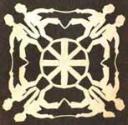It is odd how smells affect the human brain. Example: the leaking water pipe in our kitchen has finally been fixed but there is an odd damp smell in the air. If I close my eyes I'm immediately transported to my great-grandmother's pantry/scullery in rural Denmark circa 1981. My great-grandmother lived in a damp old house in a small village. She had a huge garden which supplied her (and her two sons who remained with her) with fresh produce virtually all year round. The house was always in constant need of repair, the loo was outside and there was no hot water - but I had my tree house in an apple tree, the attic was filled with relics pre-WWII and I'd do little archaeological digs at the back of the house (next to the caravan where my mother slept as a teenager, behind the makeshift football pitch/outdoors badminton court and right by the cherry trees). At Christmas time, the house would fill with her eleven children, their spouses and own offspring. Her sons would sit around the big table with their playing cards, their cigarettes and beer bottles. Her daughters would be in the kitchen cooking the Christmas food, opening the mysterious jars on the top shelves of the pantry and cursing the lazy men.
My great-grandmother (and her two sons) moved into our little rural town some fifteen years later. Her house had become too cold and too damp for an old lady. She finally got hot running water, a real bathroom and a shop across the street. But she had her sons build her a pantry and she turned most of the new garden into a vegetable patch.
She passed away some six years ago. And here I am, her quiet great-grand-daughter, in a Glasgow tenement flat on an overcast Saturday afternoon and I'm looking forward to picking brambles later this year and making bramble jam - just like Nan would've expected of me.


 Today a gækkebrev arrived. Literally meaning "a riddling letter", a gækkebrev is a letter in the shape of an elaborate paper cut-out with a riddle written in its middle. Sometimes a snowdrop is included with the letter, sometimes the riddle just alludes to the snowdrop.
Today a gækkebrev arrived. Literally meaning "a riddling letter", a gækkebrev is a letter in the shape of an elaborate paper cut-out with a riddle written in its middle. Sometimes a snowdrop is included with the letter, sometimes the riddle just alludes to the snowdrop.